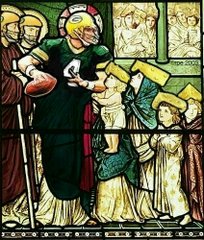 Prayer
PrayerO Lord, in this wondrous Sacrament You have left us a remembrance of Your passion. Grant that we may so receive the sacred mystery of Your body and blood that the fruits of Your redemption may continually be manifest in us; for you live and reign witht eh Father and the Holy Spirit, one God, now and forever.
Devotional Reading
C.F.W. Walther writes:
"The apostle [Paul] wishes to say: Consider, beloved Christians, that when you receivethe blessed cup and the blessed bread, each one partakes of the body and blood of Christ; they are both common to ...all of you. You come into body-and-blood fellowship with one another. For just as many grains become one bread, so in the Holy Supper, you, though youa re many, become one Body, one mass, because you are partakers of the one bread and with it one and the same body and blood of Chrsit.
"Because of the presence and praticipation of the body of Christ, the Holy Supper is a meal of the most intimate fellwoship and therefore, at the same time, the highest love-meal. Just as fervent love is demanded, so fervent love is delivered. We all come together, as children of the same family, to the table of our common, heavenly Father. As great as the distinction between communicants in civic life may be, in the Holy Supper all distinctions evaporate. We are all the same, in that we each eat the same earthly and heavenly drink the same earthly and heavenly drink. In this Meal, the subject and his king, the slave and his master, the beggar and the rich, the child and the old man, the wife and the husband, the simple and the learned, truly all communicants stand as the same poor sinners and beggars, hungry and thirsty for grace. Although one may appear in a rough apron while another in velvet and satin, adorned with gold and pearls, when they depart, all take with them that for which they hunger and thirst: Christ's blood and righteousness as their beauty and glorious dress. No one receives a better food and better drink than the other. All receive the same Jesus, and with Him, the same righteousness."
Catechesis
Luther's Large Catechism
V. The Sacrament of the Altar
Who receives this Sacrament worthily?
Since this treasure is entirely presented in the words, it cannot be received and made ours in any other way than with the heart. Such a gift and eternal treasure cannot be seized with the fist. 37 Fasting, prayer, and other such things may indeed be outward preparations and discipline for children, so that the body may keep and bring itself modestly and reverently to receive Christ’s body and blood. Yet the body cannot seize and make its own what is given in and with the Sacrament. This is done by the faith in the heart, which discerns this treasure and desires it. 38 This may be enough for what is necessary as a general instruction about this Sacrament. What may be said about it further belongs to another time.
39 In conclusion, since we now have the true understanding and doctrine of the Sacrament, there is also need for some admonition and encouragement. Then people may not let such a great treasure—daily administered and distributed among Christians—pass by unnoticed. So those who want to be Christians may prepare to receive this praiseworthy Sacrament often. 40 For we see that people seem weary and lazy about receiving the Sacrament. A great multitude hears the Gospel. Yet because the nonsense of the pope has been abolished and we are freed from his laws and coercion, they go one, two, three years, or even longer without the Sacrament. They act as though they were such strong Christians that they have no need of it. 41 Some allow themselves to be hindered and held up by the excuse that we have taught that no one should approach the Sacrament except those who feel hunger and thirst, which drive them to it. Some pretend that it is a matter of liberty and not necessary. They pretend that it is enough to believe without it. For the most part, they go so far astray that they become quite brutish and finally despise both the Sacrament and God’s Word.
42 Now, it is true, as we have said, that no one should by any means be forced or compelled to go to the Sacrament, lest we institute a new murdering of souls. Nevertheless, it must be known that people who deprive themselves of and withdraw from the Sacrament for such a long time are not to be considered Christians. For Christ has not instituted it to be treated as a show. Instead, He has commanded His Christians to eat it, drink it, and remember Him by it.
43 Indeed, those who are true Christians and value the Sacrament precious and holy will drive and move themselves to go to it. We will present something on this point so that the simpleminded and the weak who also would like to be Christians may be more stirred up to consider the cause and need that ought to move them. 44 In other matters applying to faith, love, and patience, it is not enough to teach and instruct alone. There is also need for daily encouragement [Hebrews 10:24–25]. So here also there is need for us to continue to preach so that people may not become weary and disgusted. For we know and feel how the devil always opposes this and every Christian exercise. He drives and deters people from them as much as he can.
Concordia : The Lutheran Confessions. Edited by Paul Timothy McCain. St. Louis, MO : Concordia Publishing House, 2005, S. 435






No comments:
Post a Comment